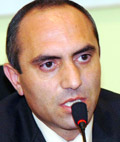There are 500-550 tons of garbage filled in the garbage cans in Yerevan daily. Fifteen sanitary companies move those garbage cans and seven of them are private companies. The municipality no longer provides financing and the quarter-municipalities only pay money for cleaning the streets. Businessmen and residents pay money for removing the trash on their streets.
Neither the municipality nor the quarter-municipalities hide the fact that garbage cleaning in Yerevan is bad. They have a reason for this-there is not enough money to keep the streets of Yerevan clean. A couple of years ago, the municipality was providing money for that, but now it is all up to the quarter-municipalities. Everyone knows that the residents and businessmen who want to remove the trash off their streets have to pay a sum of money. Since the quarter-municipality is on a low budget and the residents who throw the trash don’t want to pay money to clean it up, there is a huge amount of trash on the streets of Yerevan. The quarter-municipality’s budget is not only not enough for cleaning the streets, but also to buy new technologically advanced equipment. The streets of Yerevan are cleaned with the old, Soviet trucks. Although the quarter-municipality members are trying to hide the fact that they are too cheap to buy new trucks, however, they want to find a solution to the problem.
 There is a private company cleaning the trash off the streets of Davtashen. According to quarter-municipality head Surik Ghukasyan, they will provide 55 million drams to the company and will collect 2 million drams from the residents.
There is a private company cleaning the trash off the streets of Davtashen. According to quarter-municipality head Surik Ghukasyan, they will provide 55 million drams to the company and will collect 2 million drams from the residents.
“Garbage cleaning is the main problem facing all communities. The quarter-municipality’s budget is not enough to clean all the streets,” says Mr. Ghukasyan.
Representative of the “Davitashen sanitary cleaning” INC Gevorg Karapetyan also complained that 60% of the population pays for garbage cleaning. The money that the quarter-municipality collects and receives makes up 6.6 million drams (15,000 dollars). Mr. Ghukasyan knows very well that that is not enough for efficient cleaning. Mr. Karapetyan complained that the price for cleaning garbage is very low.
“The price for cleaning garbage should be 190 drams,” says G. Karapetyan. “100 drams is not enough for cleaning the garbage efficiently. If the price of gas goes up, we won’t be able to work. Today, things are going good because I work with gas.”
According to G. Karapetyan, the price for cleaning garbage must go up and all citizens have to pay in order to get new equipment. He complains that there is no way of persuading the citizens to pay and claims that it can’t go on like this.
One of the projects aimed towards cleaning the garbage in Yerevan is implemented by the “AutoInvest Center” company and the owners are Armenian. The municipality is discussing this project. Head of the communal department of the municipality Frunze Basentsyan says that that company has had success in cleaning the streets of Mosow. At first sight, the project is a good one. There will be one truck working in Yerevan; the businessmen or resident must first put his or her trash in order and then throw it in the garbage can. The people throwing the trash have to sign a contract with the company and they must know that they have to pay a price. Besides that, new containers and garbage trucks must be bought and that requires a lot of money.
While getting acquainted with the project, we remembered how the water supply company was privatized and how the new owners and foreign workers promised to provide the citizens of Yerevan with high-quality water 24 hours a day. It is quite possible that the garbage cleaning will become a public service and will then be handed over to a foreign company. The quarter-municipality will probably get credit from the World Bank because it is rare for the worker to invest and then receive his money back when the system is up and running. In other words, garbage cleaning will turn into a public service and the committee on public services will decide how much the citizens have to pay.
 “The important thing is that the trash will be cleaned off the streets,” says head of the Arabkir quarter-municipality Hovhannes Shahinyan. “Who cares about who will do that, how many companies will be involved with this, whether or not the company will be private or state owned. I am not against having a large company making investments and regulating the activities. I am of the opinion that today, communities can team up with the municipality and implement a project together. Anything is possible. We had a problem of garbage cleaning, but we overcame the obstacle.”
“The important thing is that the trash will be cleaned off the streets,” says head of the Arabkir quarter-municipality Hovhannes Shahinyan. “Who cares about who will do that, how many companies will be involved with this, whether or not the company will be private or state owned. I am not against having a large company making investments and regulating the activities. I am of the opinion that today, communities can team up with the municipality and implement a project together. Anything is possible. We had a problem of garbage cleaning, but we overcame the obstacle.”
The sanitary cleaning company of the Arabkir quarter-municipality has already bought 30 trucks and 100 new garbage disposal bins. Hovhannes Shahinyan said that they will have yet another 20 disposal trucks and 300 new garbage cans in a couple of months and then they will be able to work more efficiently. The problem is collecting the money from the residents. But Shahinyan believes that first they must do the work well and then ask for money.
“We must show citizens what they are paying for,” says Hov. Shahinyan. “It is then that the citizens will see what we are doing and will realize that they must pay. We must get other organizations to cooperate with us. But I must say that this is not a good price for cleaning the garbage. The current price doesn’t even cover 40% of expenses. Even if all the residents pay us, it will still not be enough. I think that the minimum price that the residents must pay is 200 drams. We must simply take into consideration the fact that there are people who can’t pay that much and that each year the quarter-municipality provides money.”
 Head of the Kanaker-Zeytun quarter-municipality Arayik Kotanjyan is not against having one company serving all the communities of Yerevan. But he thinks that it would be better to have a local company working in the given community. The company working in this company is owned by the state and is part of the quarter-municipality.
Head of the Kanaker-Zeytun quarter-municipality Arayik Kotanjyan is not against having one company serving all the communities of Yerevan. But he thinks that it would be better to have a local company working in the given community. The company working in this company is owned by the state and is part of the quarter-municipality.
“Our workers know the entire community,” says Mr. Kotanjyan. “They already know how to work and do the job well. Of course, they will work better if they have more money.”
There are 77,000 people living in the community. If each resident pays for cleaning the garbage, there will be 7.7 million drams a month, plus the money paid by businessmen. According to owner of the “Sanitary Cleaning” company of the Kanaker-Zeytun quarter-municipality Krist Gasparyan, 40% of the money is collected (2.6-2.9 million drams a month and an average of 30 million drams a year). The quarter-municipality adds another 100 million.
“This is a company that primarily works with the money paid by the citizens,” says Mr. Gasparyan. “100 dram is not enough for the work that we do. That amount was okay 10 years ago, but the price for gas has gone up a lot during the past 10 years, as well as prices for equipment. The trucks that we have are old and need to be repaired every day. The only truck that works well is the truck we got from Russia back in 1989.”
K. Gasparyan also agrees that the fee must go up and everyone must pay. According to him, the people who don’t pay are the rich and people in extreme povety. Businessmen also don’t pay.
“There are families that have a 35-40 thousand dram debt,” says K. Gasparyan. “When our accountants go to collect the money, the residents close the door in front of their faces. We told everyone to pay this month, otherwise, we will take certain measures.”
Quarter-municipality head A. Kotanjyan is against charging the residents by court. According to him, it would be better to propagandize.
“The residents are used to piling the trash in yards and streets,” says head of the quarter-municipality. “Most of them will most definitely not pay for removing that trash. Let’s say we appeal to the court and they still don’t pay. What are we going to do? Should we go to their houses and steal the refrigerator or television? I am not in favor of that. We have posted bulletins near the entrances of all buildings, asking the residents to pay 500 drams to remove the trash. I must say that this method is starting to work. The residents have to have a reason for paying.”
While the quarter-municipalities are trying to come up with ways of cleaning the garbage, the municipality is thinking about making serious reforms. However, Frunz Basentsyan says that no matter what they decide, they will do it with the quarter-municipalities based on their agreement.
